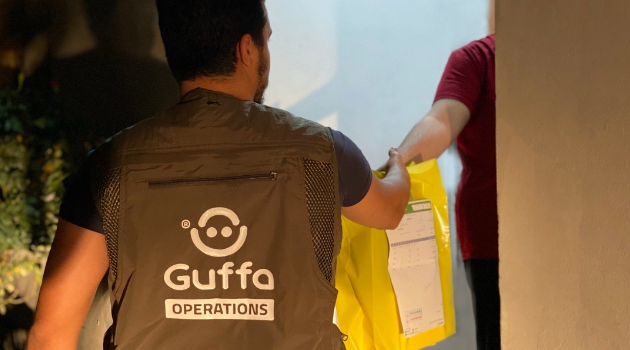By John Lee.
A Libyan entrepreneur's online platform delivers supplies during the COVID-19 lockdown and the ongoing conflict
Like many other countries in the world, Libya imposed emergency lockdown measures, enforcing closure of all public spaces and a curfew in an attempt to prevent the spread of the novel Coronavirus (COVID-19).
The lockdown ordered the shutdown of all large markets, non-essential commercial activities and banned car movement, restricting people's mobility and access to commodities.
Guffa, a newly established multivendor online application, became a solution for people in Tripoli seeking to purchase items like food, clothing, cosmetics and electronics. Its founder, 27-year-old Shaker Al Gubtan, has been working on developing his business for the past two years to offer residents of the capital online shopping and delivery solutions.
Shaker participated in the Tatweer Entrepreneurship Campus (TEC); an initiative that aims to promote an entrepreneurship ecosystem in Libya through various programs including business incubators, co-working spaces, training programs in technology, business administration, and financial management across Libya.
TEC was launched in March of 2017 by Tatweer Research and The United Nations Development Programme (UNDP) with the support of the European Union (EU), and has so far, helped around 75 entrepreneurs in Libya to develop their business ideas.
From idea to reality
Shaker remembers the project's beginnings; a mere idea that began with a group of his friends. The continuation of the project was halted on several occasions, and Shaker ended up working on the project independently. With established knowledge in Information Technology (IT) and marketing, Shaker felt he lacked business management skills, and applied to join the business incubator program at TEC in Tripoli.
He explains, "after successfully passing the training, I started working on launching "Guffa," which is a Libyan term that refers to the traditional basket made of palm leaves and used to carry food."
The online application is available on Android and iOS mobile devices, where customers are able to download and order directly from the platform. The order then gets delivered to the location specified within the Greater Tripoli area.
Launching "Guffa" amidst war and a pandemic
After two years of hard work, the application was launched in April 2020, but not without struggle. Shaker mentions that he faced many obstacles along the way, including financial limitations, technical difficulties as well as challenges reaching fair agreements with suppliers. Trying to run a new business while fighting is still ongoing in his city does not prove easy either.
He says, "to keep working in the midst of conflict, with the constant bombardment of missiles feels crazy, especially because our delivery staff go out and risk their lives doing so. It's weight on my shoulders, but they insist on doing their job without complaining."
Another challenge came their way this year as the pandemic hit the world at large, and lockdown measures were put in place in the war-torn country. Nevertheless, Shaker and his team saw the restriction of movements as an opportunity to gain leverage. "We hurried to communicate with the authorities in Tripoli, which gave us with the needed permits to deliver," explains Shaker.
The delivery team of six employees transports goods from suppliers to customers and have undergone training on how to take the necessary measures to ensure that delivery is done safely. They have also been provided with gloves and masks, and Shaker makes sure they wash and disinfect their hands before and after delivering each order.
The team is currently working at all hours to ensure people in the capital receive the needed supplies, especially during the month of Ramadan, where most people in Libya are fasting.
Prepared for the challenges ahead
The "Guffa" team believe that there are many coronavirus-related challenges ahead they have yet to face. "The decline in the value of the Libyan Dinar, coupled with the slowdown of manufacturing power of food items will be a major concern going forward," states Shaker. The expected increase in food commodity prices worries him, but he is prepared to face the challenge, saying "we will not standby idly. We will develop our operational management system and improve our user experience to include the largest number of suppliers possible."
Shaker and his team still receive guidance from the TEC incubator mentors who provide them with advice on business management, marketing, operations management and human resources.
Big dreams
Shaker is passionate about Guffa and has big dreams for the future of his business. He plans to expand the services to include all of Libya, from the smallest village to larger cities. He then hopes to expand his reach in North Africa and the Middle East. "Why not?" he says, "some of the biggest applications in the world faced similar challenges at the beginning, maybe even more, so we have hope, and we're going to keep moving onward." Despite the hardships, ongoing war and current pandemic, Shaker is determined to keep pushing forward and realize his dreams for the company.
To date, the EU and UNDP supported TEC initiative implemented in partnership with Tatweer Research has provided learning opportunities, mentorship and assistance to 30 technology-focused businesses that have launched their companies in Libya. With continued support to Libyan youth and fostering of an entrepreneurship ecosystem, people in Libya will be able to address needs within their communities as well as create livelihood opportunities.
This project is implemented in the framework of the programme "Managing mixed migration flows in Libya through expanding protection space and supporting local socioeconomic development" financed by the North of Africa Window of the EU Emergency Trust Fund for Africa. The main objective of this programme is to comprehensively reinforce protection and resilience of migrants, refugees and host communities in Libya while supporting an improved migration management along the migration routes in the country.
(Source: UNDP)





